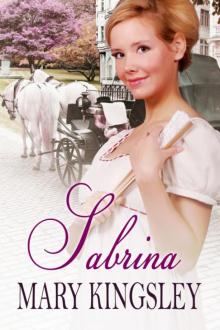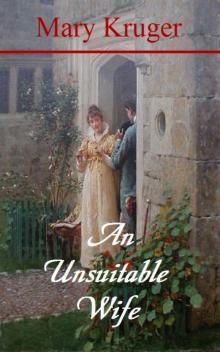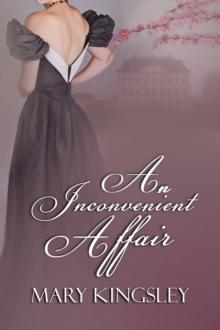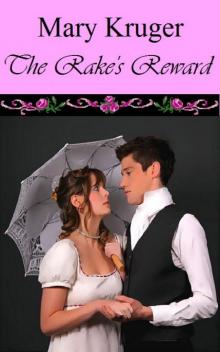- Home
- Kruger, Mary
Sabrina
Sabrina Read online
Sabrina
by
Mary Kingsley
Smashwords Edition
Copyright 2011 Mary Kruger
Smashwords Edition, License Notes
This ebook is licensed for your personal enjoyment only. This ebook may not be re-sold or given away to other people. If you would like to share this book with another person, please purchase an additional copy for each recipient. If you’re reading this book and did not purchase it, or it was not purchased for your use only, then please return to Smashwords.com and purchase your own copy. Thank you for respecting the hard work of this author.
Cover art copyright 2011 Razzle Dazzle Designs
To my mother, Madelyn Sweeney Kruger:
You and me against the world, Mom, and this time I think we won.
Chapter 1
His Grace, Oliver Carrick, fifth Duke of Bainbridge, folded the letter and frowned. “Good God.”
“Exactly, Your Grace,” said the man who sat at the untidy, paper-littered desk across from him, his periwig a trifle askew. Mr. Warrenton, solicitor, had handled the Carrick family’s affairs for years, but never had he come across such a problem.
“She is here now? In your chambers?”
“In the next room, Your Grace.”
“And you are satisfied she is not a fraud?”
“She has the missing Carrick rings,” he said, apologetically.
“Damn! Before today I’d hardly ever heard of Gerald Carrick.”
“I believe, Your Grace, that he probably meant the letter for your father, the late duke.”
“And the girl, too.” Oliver looked again at the missive that was the cause of this extraordinary upheaval. When the messenger had come to Bainbridge House, urgently requesting my lord Bainbridge’s presence at Mr. Warrenton’s offices, Oliver had never expected—this.
“My dear Bainbridge,” the letter began. “You probably remember me, Gerald Carrick, the proverbial prodigal son.”
Oliver did remember something about Gerald Carrick, his now-late cousin, but it had happened a long time ago, when he was only ten, and his memories were sketchy.
“If you are reading this, then I am already dead,” the letter continued, “and you have met my daughter.”
Not yet, the duke thought, grimly.
“She is a good girl and deserves better than me for a father.”
Doubtless, thought the duke.
“Therefore I am naming you her guardian...”
Good God.
“...and hope that you will forget my past sins, for her sake. Everything is in order, as you will see from the papers I have had drawn up.”
Oliver lifted his head. “Everything is in order?”
“Yes, Your Grace.”
“Damn.”
“Take care of my little girl, Bainbridge,” the letter said. “She is but a child and will not know how to get on in London. I depend on you to do what is right for her.”
Ha! Oliver doubted that the girl needed any guidance. Instead, he had a shrewd suspicion that his new ward was an aging, designing hussy, out to secure whatever she could from him. A man in his position made a convenient target for the tricksters of the world.
“There is, unfortunately, no money....”
Of course not.
“...but perhaps you can pry some out of the old girl.
“I remain, affectionately,
“Yrs.,
“Gerald Carrick.”
Oliver folded the letter and then held it delicately between his fingertips. “Who is the ‘old girl’ he speaks of?” he asked.
“I believe he refers to the dowager duchess, Your Grace,” Warrenton said reluctantly. “He was, as you know, the son of the late duke’s brother.”
“Yes, my uncle Everett. Was he at all like my uncle?”
“Oh, dear me, no, not at all. Lord Everett is a fine, upstanding man.”
Oliver’s eyebrow rose again, this time skeptically. “From which I should infer that Gerald was not? I guessed as much. Pray enlighten me. What are the sins he speaks of?”
“I’m not quite sure, Your Grace. It happened so very long ago.”
“Yes, twenty years ago, in 1792, if I recall. But I don’t quite remember the circumstances. Must I ask you again to enlighten me?”
The man behind the desk blanched. When the Duke of Bainbridge looked at one in that way, his gray eyes turned to cold steel, the only thing to do was to obey him. “I believe he had gambling debts, Your Grace, that he did not pay.” Oliver raised his eyebrow again. “I suspect there was a woman involved, and, at the time, I heard rumors of a duel.”
“Did he kill his man?”
“I am not sure, Your Grace. In any event he quarreled with his father and then emigrated to America. To my knowledge, no one has heard from him since.”
“Until now.” He fixed the solicitor with a stern eye. “Are you sure it isn’t a hoax?”
Mr. Warrenton swallowed. “Quite sure, Your Grace. All the papers appear to be in order. Of course, the girl does not look like a Carrick.”
“No?”
“When I opened the door to her, I was inclined to turn her away. If she didn’t have the rings...”
“Yes,” Oliver said. “May I see them?”
The solicitor handed the rings across the desk, and though he had never seen them before, Oliver recognized them instantly, from the descriptions he’d heard over the years. One was a signet. Bearing the Bainbridge crest, it was meant to be worn by the present duke only. The other, a large, square-cut emerald set in gold, had once adorned the hand of Oliver’s uncle, the late Gerald’s father. Somehow Gerald had managed to spirit away both rings, something which had caused more uproar than his subsequent disappearance. Oliver could still remember the awe-inspiring rage his father had gone into when he’d learned of the theft. “Well, Warrenton, these appear to be genuine.”
“Yes, Your Grace.”
“Where is the girl?”
“In my library, Your Grace. Through that door.”
Oliver rose. “I suppose I should see her.”
“Your Grace?” Oliver turned. “What do you plan to do with her?”
“I haven’t the faintest idea,” he said, and went into the other room.
Chapter 2
Like their owner, Mr. Warrenton’s offices were desiccated and dusty. The windows, thick with grime from many a London winter, let in little light. The library was a dull room, paneled in oak that had never felt a dust rag and filled, everywhere, with books bound in dark, sober colors. At first Oliver didn’t see the girl who was causing him such trouble, and he wondered if she had lost her nerve and left.
Mr. Warrenton cleared his throat. When there was no reaction he cleared it again. “Miss Carrick.”
“Um.” The sound came from what Oliver, in the dim light, had assumed to be a pile of rags on the armchair that was pulled close to the empty, sooty fireplace. If his alleged cousin had hoped for a bit of warmth, she had been sadly disappointed.
“Miss Carrick, please get up.”
The rags moved. A contraption that proved to be a particularly hideous bonnet lifted, and a pair of bleary eyes stared at them, blankly.
Oliver watched in fascinated revulsion. “Mr. Warrenton, are you sure?”
“Quite sure, Your Grace. Miss Carrick, you will get up!”
This time it was a command, and it finally seemed to penetrate. “Oh. Oh!” The girl sat up very fast and stumbled to her feet. Oliver quickly stretched out his hand to keep her from falling, only a trace of distaste showing on his aristocratic features. “T-thank you,” she stammered.
“Thank you, Your Grace,” Mr. Warrenton said.
She darted him a frightened look. “Thank you, Your Grace.”
“They don’t have titl
es in America,” he said to the duke. “Barbaric country.”
Oliver, studying the girl, didn’t answer. She certainly did not look like a Carrick. Her eyes and nose were red and swollen, and her hair had both the color and the texture of straw. Underneath a dun-colored cloak of indeterminate age and style, she wore a black dress, obviously mourning garb and just as obviously many years out of date. Her figure was poor, pudgy and shapeless, and she was much younger than he had expected. Whatever was he to do with her? “Does she have a name?”
“Girl, tell His Grace your name,” Mr. Warrenton said.
The girl looked at Oliver and then studied the floor. “Sabrina.”
“Sabrina, your—”
“Sabrina, Your Grace.”
“See that you remember it in future.”
“Don’t browbeat the girl, Warrenton,” Oliver said, mildly enough for Warrenton to stare at him in surprise. “Doubtless our customs are new to her.” He reached out to lift her chin. For one mutinous moment something sparked in the girl’s eyes. For just that one moment, he thought she was going to jerk her head away. Then it passed, so quickly that Oliver wasn’t sure it had happened. “You do not look like a Carrick.”
“I’m told I take after my mother. Sir,” she added as an afterthought. He winced at the nasal quality of her voice.
“Who was your mother?”
Her chin lifted. “Annemarie Van Schuyler.”
He raised an eyebrow. “Dutch?”
“No, sir. American.”
He ignored that, though Mr. Warrenton clearly longed to give the girl the setdown he thought she deserved. What was he going to with this girl? She had no fortune, no beauty, and, apparently, no intelligence under that unbelievably homely face. He could hardly bring her to Bainbridge House; he kept bachelor quarters and had no place for a young, unchaperoned girl. He was also short of female relatives to foist her onto. His mother was dead, and Marianne, his sister, was in Street Petersburg with her diplomat husband. That left only Grandmama. She would not be pleased. “Where is your maid?”
“I have none. Sir.”
His eyebrow rose again. “None? You came here, across the Atlantic, unescorted?”
“Yes, sir.”
“Miss Carrick, either you are very lucky or very stupid. I have not decided which.” She put up her chin again. “Either way, it will not do. You may be able to dispense with the rules of polite society in that wilderness, but such behavior will not be tolerated here. In the future, you will behave properly.”
“Have I a choice?”
“No, Miss Carrick, you do not. Mr. Warrenton.”
The little man snapped to attention. “Your Grace?”
“Please send a messenger to Bainbridge House. I wish to have my traveling carriage made ready, and my staff informed that I will be going into the country.”
“Of course, Your Grace!”
“Oh, and Warrenton,” Oliver said.
“Yes, Your Grace?”
“There is one thing more I would have you do for me.”
“Certainly, Your Grace.” Oliver drew closer and spoke in low tones. Once or twice Mr. Warrenton glanced over at the girl standing by the chair, looking blankly about her. “‘Twill be expensive, Your Grace,” he said finally.
“The money does not signify. See to it, Warrenton, as soon as possible.”
“Yes, Your Grace.” He bowed again and ran from the room.
Thus satisfied that he had thrust a spoke in his new cousin’s wheel, Oliver turned back to her. The information he had asked Warrenton to procure for him would take some time to gather. In the meantime, he had to do something with her. God save me, he thought. “My inclination is to bring you to lodgings somewhere and leave you there, but your father was right about one thing. You would not know how to get on in London. I shall bring you to the dowager duchess, God help her.”
“Who is she?”
“My grandmother, and possibly your great-grandmother. You will behave properly with her, my girl, or you will answer to me.”
Sabrina’s eyes were downcast. “Yes, Your Grace,” she murmured. Oliver cast one more suspicious look at her and then turned away. The sooner they could be rid of her, the better.
The coach was new, painted in the Bainbridge colors of midnight blue and gold, and bearing the Bainbridge crest. At another time Sabrina would have been in awe of such splendor, but all she cared for now was that it was well-sprung and comfortable. She was well aware that, on what was possibly the most important day of her life, she was far from her best. She hadn’t been able to bathe lately, except in salt water, she had a wretched cold, and she was so tired. She felt as dull and unattractive as she looked, and it was impossible to frame two coherent thoughts in a row, let alone speak intelligently. Had she had any money she would have found lodgings and waited until she recovered before facing Mr. Warrenton and the duke, but the fare for the stage from Liverpool had taken nearly all her funds. She was dependent on the mercy of strangers, none of whom seemed kindly disposed toward her. Papa might have warned me, she thought, and then smiled. Since when had Papa ever spared a thought for anyone but himself?
Up until six months ago, life in the village of Sparta, in New York, had been placid and uneventful, enlivened only by Papa’s occasional bouts of drinking. Then Papa had died. The shop he had owned was Sabrina’s only means of livelihood, and her home, as well, since she lived above it, but she was forced to sell it to cover the debts that he had left. She had nowhere to go. Her Van Schuyler relatives had cast her off long ago, and she knew nothing of Papa’s family. Somehow she was going to have to manage on her own.
Her prospects changed when she was packing her meager belongings, preparatory to vacating the shop. In the bottom of a bureau drawer she found a small wooden box, with two rings inside. Sabrina had little knowledge of jewels, but somehow she knew that these were old and valuable. How her improvident father had come across such treasures, she could not imagine. There were also letters in the box, one addressed to her, another to a solicitor in London, of all places, and the last, the most startling one, to His Grace, the Duke of Bainbridge. How in the world did Papa know a duke? she wondered, and opened his letter to her.
Inside all the questions she had ever had about him were answered, in-between the bitter invective about his family. She was not, as she had thought, alone in the world. Why Papa had seen fit to argue with his father she did not know, but knowing his temper she wasn’t surprised. What mattered now was that there was someone she could turn to, should she find the courage.
The tone of the letter turned fatherly toward the end. Should she be underage when her father died, she was to go to England, where the Duke of Bainbridge would be her guardian. It ended with an admonition not to be too honest, at least, not in the beginning.
The word “guardian” worried her a little, and so the next day she visited the lawyer who’d handled her father’s affairs and learned that, as she was just turned seventeen, the duke was indeed legally responsible for her. The lawyer had kindly added that no one was trying to force her out and the duke did not have to learn of his new responsibility just yet. Distracted, Sabrina agreed.
She had taken a room in a neighbor’s house, but already it was apparent she could not stay there forever. Mrs. Turner, while not mean-spirited, appeared to consider Sabrina an unpaid servant. Sabrina didn’t mind work, but she did mind the imposition. The daughter of the house, a year or so younger, was increasingly jealous, while the son was beginning to look at her in a leering, knowing way. She had to find some way out soon, and she focused on the prospect of a family as her salvation.
Sabrina had never really known what family life was like. Now, as she worked and scrimped and saved enough to buy passage to England, she tried to imagine her relatives. In this year of our Lord 1812, relations between the United States and her former mother country were not good, but that hardly mattered to Sabrina. She had a grandfather, imagine that! Papa had probably looked like him, and pe
rhaps taken his disposition from him. How grateful he would be, to have his long-lost granddaughter restored to him! Grandfather’s brother, the duke, would welcome her because she would be able to restore to him his property, the rings. Great-Grandmother was probably a sweet, frail old lady to whom Sabrina would be a comfort in her old age. There were also the duke’s children, and other relatives. For the first time Sabrina had the hope of belonging. She could hardly wait.
Reality had come hard, in the form of the small, leaky ship that had brought her to England. Its passage had been all she could afford, and she had spent her days in discomfort and fear of the crew. Reality had been the hard, unpadded seats of the Liverpool to London stage, and the leers and lewd suggestions men seemed to feel free to make to an unaccompanied female. Reality had been Mr. Warrenton’s sneers, and the shocking realization that, not only had no one in England ever heard of her, no one wanted her, either. Reality was that the kindly old duke of her imaginings was dead, and in his place was Oliver Carrick, cool, arrogant, haughty, and undeniably the most handsome man she had ever seen.
Cautiously on the seat across Sabrina opened one eye and looked at him. He sat in the corner opposite to her, his dark hair casually brushed back and his nose, strong and straight, making his face look hawklike, as he studied the passing countryside. To Sabrina’s uneducated eyes, he looked the very picture of a nobleman, though Bainbridge was his valet’s despair. Though everything he wore was of the finest material, crafted by the best tailors, no one would ever look to him as an arbiter of fashion. His boots, Hoby’s finest, had only an indifferent shine, his shirt points were only moderately high, and his neckcloth was tied neatly, but conservatively. His coat, made so that he could shrug into it unassisted, sat well upon his broad shoulders, shoulders that would be a bulwark against the world for some lucky girl. Sabrina could almost feel the strength and power in his arms as they closed about her....
Oliver chose that moment to turn and stare at her, as if he could read her thoughts. Sabrina turned first a bright, deep red, and then very pale. She knew that she blushed easily, but no one had ever told her how much her face revealed of what she was thinking. Oliver, watching her changing reactions, was not about to enlighten her.

 Sabrina
Sabrina Rogue's Charade
Rogue's Charade Unsuitable Wife
Unsuitable Wife In a Pirate's Arms
In a Pirate's Arms Crystal Heart
Crystal Heart Inconvenient Affair
Inconvenient Affair Summer Folly
Summer Folly Rake's Reward
Rake's Reward Gifts of the Heart
Gifts of the Heart